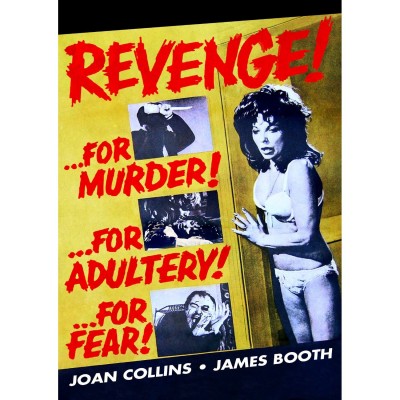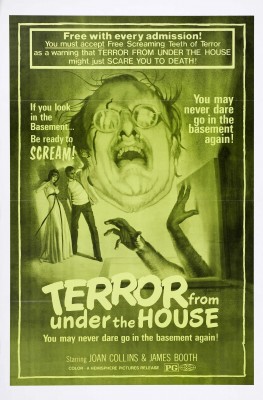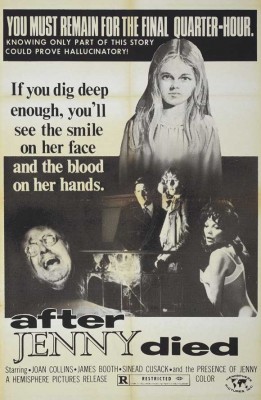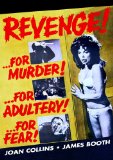| Reviews & Columns |
|
Reviews DVD TV on DVD Blu-ray 4K UHD International DVDs In Theaters Reviews by Studio Video Games Features Collector Series DVDs Easter Egg Database Interviews DVD Talk Radio Feature Articles Columns Anime Talk DVD Savant Horror DVDs The M.O.D. Squad Art House HD Talk Silent DVD
|
DVD Talk Forum |
|
|
| Resources |
|
DVD Price Search Customer Service #'s RCE Info Links |
|
Columns
|
|
|
Revenge
Scorpion Releasing's DVD is, regrettably, 4:3 matted widescreen and not 16:9 enhanced, though on widescreen TVs the 1.66:1 image formats reasonably well to 1.78:1. The feature can be watched with or without the "Katarina's Nightmare Theater" bumpers. The host, accurately described by DVD Savant as almost a cross between actresses Caroline Munro and Lucy Lawless, is for film purists much less offensive than others of her ilk, e.g., the campy Elvira. For starters, Katarina provides a few genuinely useful pieces of information about the film and its release. Numerous trailers for other Scorpion releases round out the package.
Early scenes are reminiscent of Hammer's ahead-of-its-time Never Take Sweets from a Stranger (1960). The Radford family - father Jim (James Booth), stepmother Carol (Joan Collins), Jim's adult son Lee (Tom Marshall), and teenage daughter Rose (Sinéad Cusack) - are mourning the molestation and murder of their beloved Jenny. Seely (Kenneth Griffith), the chief suspect in Jenny's murder as well as another little girl, the daughter of Jim's friend Harry (Ray Barrett, Thunderbirds, Mogul), is released on a technicality.
Harry and Lee pressure Jim into agreeing to kidnap Seely for the purpose of beating a confession out of him, or maybe kill him, or maybe to just confine him and play it by ear. (If this story intrigues you, dear reader, I recommend that you stop reading this review now if you want to avoid major plot points further down.) The screenplay by John Kruse, who mostly wrote for British television but also penned the short story that was the basis for Hell Drivers (1957), is very smart and realistic in the way this trio goes off half-cocked, driven by emotion. They don't plan the kidnapping well nor think through what they're going to do with Seely if and when they catch him.
Naturally, things go horribly wrong from the start. A stray German Shepard attacks Harry, biting at the blanket intended to immobilize Seely, just as he walks through an alley. Further, Jim's car won't start just when they should be making their getaway.
Nevertheless, Seely is captured and thrown into the wine cellar-stock room beneath The Crown, Harry's free house (English pub). (Mild Spoilers) There, Jim and Harry's barely-suppressed rage get the better of them. They beat Seely to a pulp before they even have time to question him. Carol walks in, catching them in the act, and Jim strangles Seely. Impressively, in this scene everyone behaves like rabid animals.
With the pub set to open upstairs within minutes, Jim, Harry, Carol, and Lee must decide how to dispose of the body without getting caught or raise suspicion with the customers upstairs. But that's just the beginning of this story...
Revenge was produced by Peter Rogers, who from 1959 forward concentrated his energies almost exclusively on his long-running "Carry On" films (and occasional TV specials). However, in 1971 for some reason he oversaw three uncharacteristic features. The similarly vaguely-titled Assault (a.k.a. In the Devil's Garden) was likewise written by Kruse and helmed by Sidney Hayers, Revenge's director, while Quest for Love, also starring Collins, despite its title is an almost unique sci-fi drama about a scientist trapped in an alternate reality (no World War II, no Apollo 11, etc.). They must not have been profitable because with one exception for the rest of his career Rogers made only broad comedies.
Revenge nonetheless impresses in the way it believably portrays grief-stricken families struggling with guilt, regret, and suppressed rage. Lee and Carol, for instance, self-destructively flirt with one another with disastrous results. (Major Spoilers): When Seely turns out to have survived his beating and strangulation after all, the Radfords and Harry decide to leave him in the cellar, hoping he'll die for lack of medical attention, water, and food. Just upstairs they continue to operate the pub as if nothing was wrong. One occasionally hears of appalling stories like this, such as the 2002 case of the woman who hit a homeless man with her car. The man, seriously injured and stuck in the car's shattered windshield, bled to death in the woman's garage after three days. Revenge attempts to account for such inhumanity while never condoning it.
The film has several twists and turns, a few too many by the end, truth be told, though an idea introduced about two-thirds of the way through, that Seely might be entirely innocent after all is a good one, as it shakes up the narrative just when it needs it.
Collins is appropriately cast here, as the former barmaid who stepped in when Jim's wife ran, and who's helped raise the kids. She's attractive but approaching middle age and not glamorous; Collins plays several scenes without (obvious) makeup and is almost plain looking. Cusack, recently on TV's Camelot, is very good in an early role, and Griffith, who specialized in such unsavory parts, is alternately creepy and sympathetic.
Video & Audio
We received a check disc with no packaging, but the video transfer is adequate though not enhanced. The transfer seems sourced from a complete version and not the cut PG release noted in the poster above. The widescreen image, as stated above, reformats reasonably well to 1.78:1. The mono English audio, no optional subtitles, is fine. The disc is region 1 encoded.
Extra Features.
Beyond the Katarina's Nightmare Theater bumpers, the only other extra is a rather bountiful collection of Scorpion Releasing trailers, several of which intrigue. More on the extra features at the top of this review.
Parting Thoughts
Revenge turns out to be something of a minor find, an above-average thriller produced just as the British film industry was spiraling into the abyss. It's bleak but insightful and realistic, and overall very well done. Highly Recommended.
Film historian Stuart Galbraith IV's latest book, Japanese Cinema, is on sale now.
|
| Popular Reviews |
| Sponsored Links |
|
|
| Sponsored Links |
|
|
| Release List | Reviews | Shop | Newsletter | Forum | DVD Giveaways | Blu-Ray | Advertise |
|
Copyright 2024 DVDTalk.com All Rights Reserved. Legal Info, Privacy Policy, Terms of Use,
Manage Preferences,
Your Privacy Choices | |||||||
















